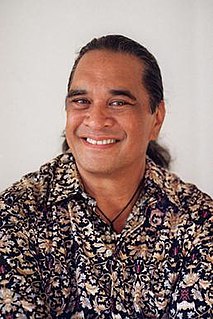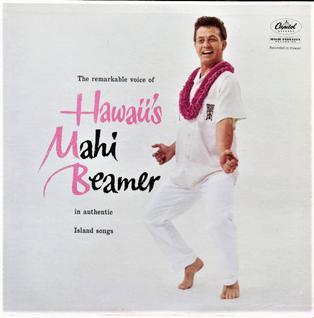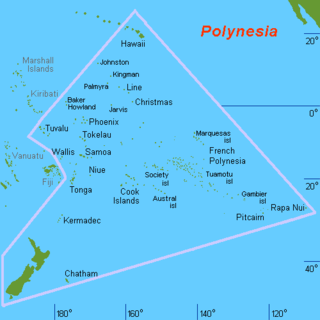
Duke Paoa Kahinu Mokoe Hulikohola Kahanamoku was a Native Hawaiian competition swimmer who popularized the ancient Hawaiian sport of surfing. He was born towards the end of the Kingdom of Hawaii, just before the overthrow, living into statehood as a United States citizen. He was a five-time Olympic medalist in swimming. Duke was also a Scottish Rite Freemason, a law enforcement officer, an actor, a beach volleyball player and businessman.

Waikiki is a neighborhood of Honolulu on the south shore of the island of Oʻahu in the United States state of Hawaii.

Mākaha is a census-designated place (CDP) in Honolulu County, Hawaiʻi, United States. It is a town located along the Pacific coast, west of the Mākaha Valley, and at the foot of Mt. Ka'ala in the Wai’anae Mountain Range. It is the last of the leeward towns on O'ahu. North of Mākaha is little development, i.e. no towns, no gas stations, or restaurants. The population of Mākaha was 8,278 at the 2010 census. It is located 35 miles northwest of Honolulu, but is a part of Honolulu County.
The music of Hawaii includes an array of traditional and popular styles, ranging from native Hawaiian folk music to modern rock and hip hop. Hawaii's musical contributions to the music of the United States are out of proportion to the state's small size. Styles like slack-key guitar are well-known worldwide, while Hawaiian-tinged music is a frequent part of Hollywood soundtracks. Hawaii also made a contribution to country music with the introduction of the steel guitar. In addition, the music which began to be played by Puerto Ricans in Hawaii in the early 1900s is called cachi cachi music, on the islands of Hawaii.
The traditional culture of Samoa is a communal way of life based on Fa'a Samoa, the unique socio-political culture. In Samoan culture, most activities are done together. There are 3 main parts in the Samoan culture, that is faith, family and music. The traditional living quarters, or fale (houses), contain no walls and up to 20 people may sleep on the ground in the same fale. During the day, the fale is used for chatting and relaxing. One's family is viewed as an integral part of a person's life. The aiga or extended family lives and works together. Elders in the family are greatly respected and hold the highest status, and this may be seen at a traditional Sunday umu.
Al Harrington is an American television actor. He is best known for his role as "Det. Ben Kokua" on the CBS television series Hawaii Five-O and as Mamo Kahike on the 2010 reboot of Hawaii Five-0 playing the owner of a surf shop and a bus driver in the off season. He had previously appeared in five episodes of the series as other characters.
Freddie Letuli,, originated the fire knife dance in 1946 at the Golden Gate Park in San Francisco, previously dancing in Hawaii and Los Angeles with two knives. Along with performing, Freddie was also the teacher to the early fire knife dancers.

The fire knife is a traditional Samoan cultural implement that is used in ceremonial dances. It was originally composed of a machete wrapped in towels on both ends with a portion of the blade exposed in the middle. Tribal performers of fire knife dancing dance while twirling the knife and doing other acrobatic stunts. The towels are set afire during the dances thus explaining the name.

Tau Moe was a singer and musician who formed The Tau Moe Family musical troupe which toured the globe for decades.

The riding of waves has likely existed since humans began swimming in the ocean. In this sense, bodysurfing is the oldest type of wave-catching. Standing up on what is now called a surfboard is a relatively recent innovation developed by the Polynesians.The influences for modern surfing can be directly traced to the surfers of pre-contact Hawaii.
Kuiokalani "Kui" Lee was a singer-songwriter, and the 1960s golden boy artist of Hawaii. Lee achieved international fame when Don Ho began performing and recording his compositions, with Ho promoting Lee as the songwriter for a new generation of Hawaiian music.

Wilfred Nalani "Moe" Keale was a musician of Hawaiian music, a ukulele virtuoso, and an American actor. He was the uncle and major musical influence of Israel Kamakawiwoʻole.

Crazy Shirts is an American T-shirt and clothing company established in 1964 and based in Honolulu, Hawaii. The company operates 35 retail stores in Hawaii, California, Florida, Nevada, and Colorado. Crazy Shirts houses the largest printing facility in Hawaiʻi, on the island of Oʻahu, and employs more than 400 employees.
Nephi Hannemann is an actor and singer of Samoan, German and English descent who has appeared numerous times on Hawaii Five-O and One West Waikiki.
Kamuela Kahoano is a singer/songwriter, painter/visual artist and music producer from Honolulu, Oahu, Hawaii. He comes from a family of entertainers, and his music has elements of acoustic, folk, indie, and alternative with Hawaiian influences . He performs solo and was formerly the lead singer of the band Analog(ic). He is an accomplished player of both the ukulele and guitar, playing both left-handed; he also plays the djembe.
Kūhiō Beach Park is a public ocean-side park on the island of Oahu, U.S. state of Hawaii, located within Waikiki Beach. It's a common gathering place for the Honolulu population and tourists due to its location and semi-protected waters.

Edwin Mahiʻai (Mahi) Copp Beamer was a tenor falsetto singer, composer and hula dancer of Hawaiian ancestry. He was born in Honolulu in the Territory of Hawaii and is the grandson of Helen Desha Beamer. His father, Milton Hoʻolulu Desha Beamer Sr. was her son. Mahi's mother was Mildred Kaaloehukaiopuaena Copp Beamer. In 2006, Mahi Beamer was inducted into the Hawaiian Music Hall of Fame. He was named a "Living Treasure of Hawaii" in 2008 by the Honpa Hongwanji Mission of Hawaii, which has been recognizing Hawaii's treasures since 1976. He received the 1992 State of Hawaii Recognition Award for his musical contributions to the state and for perpetuating his grandmother's music. Beamer was the 1993 recipient of the David Malo award presented by Rotary International for his cultural contributions.
Rudi Wairata aka Rudy Wairata(1929/1930 –1981) was an influential Indonesian musician who had fronted the Mena Moeria Minstrels and the Amboina Serenaders. Wairata's style of playing was influenced by Sol Hoʻopiʻi and Andy Iona. Along with George de Fretes he was a prominent musician in the genre of Hawaiian steel guitar music. His song "Rock'n Roll Breezes" may be the first Indo-rock song.
The Mena Moeria Minstrels
Taimane Tauiliili Bobby Gardner, also known as Taimane, is an American ukulele virtuoso and composer.





















